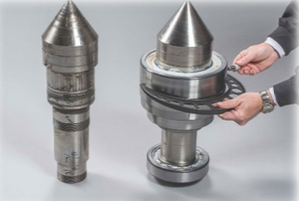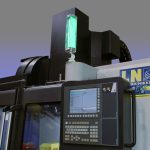Specials Program
Specials Program
The goal of the program is to minimize machine downtime and the program's process is simple. When a customer runs a machine until it fails, they can send in their damaged assembly for an engineering analysis to determine if Riten can refurbish/repair to "like new" condition−or build a complete new unit. Riten also encourages customers using the specials program to keep a complete spare assembly readily available in stock. The goal is to have one on hand at all times to avoid machine downtime during the rebuild process.

CNC machining centers continually run at full capacity to produce high-quality parts that adhere to demanding specifications. Expensive dedicated machines' workholding devices experience wear over time due to the forces of machining. Direct debilitating variables include performing in hostile environments, working with complex part geometries, or using demanding exotic material types (inconel, titanium, etc.)−all of which can promote the wear on a machine.
These demands on today's unique production operations can often be solved by simple custom-engineered workholding solutions. As specialization has increased, more forward-thinking end-users are demanding one- of-a-kind, affordable workholding solutions with added process efficiency beyond typical live and dead centers.
Riten Industries, Inc. (Riten: Washington C.H., OH / USA / ISO 9001:2015), was established in 1969 and is the largest domestic manufacturer of live centers, dead centers, and face drivers in the workholding industry. This depth of experience and knowledge has lead them to develop unique workholding solutions such as the Riten "Specials" program. The goal is to assist machinists seeking higher efficiencies for uncommon applications. These "Specials" minimize machine downtime and streamline productivity. Notably, the demand and explosive growth of customized specials has grown to represent approximately 40% of Riten's business.
Riten Specials Program Process
Based in a 35,000 sq. ft. facility in Central Ohio, Riten's engineering team has three dedicated machines that they run assemblies through for their specials program. Notably, the refurbished specials range in the thousands of dollars vs. hundreds of thousands of dollars to replace whole machines.
The goal of the program is to minimize machine downtime and the program's process is simple. When a customer runs a machine until it fails, they can send in their damaged assembly for an engineering analysis to determine if Riten can refurbish/repair to "like new" condition−or build a complete new unit. Riten also encourages customers using the specials program to keep a complete spare assembly readily available in stock. The goal is to have one on hand at all times to avoid machine downtime during the rebuild process.
According to Riten's V.P. of Manufacturing, Mitchell Kirby, "Generally, there are more replacements than refurbishments (or repairs) because most end-users often run the machine until it fails. Riten encourages customers to be ahead-of-the-curve on complete failure by scheduling machine maintenance during their down season." Kirby also noted, "It's like repairing an engine, so there is a longer lead time to replace new tools from scratch."
After their engineering analysis, Riten provides a size and cost of assembly job profile−which varies on a caseby-case basis. If it's not too damaged from the wear, the bearing assembly turnaround time is shorter. Typical turnaround time is 2-3 weeks for refurbished, and 10-12 weeks for a complete rebuild project. Riten's National Sales Manager, Kent Hizer, emphasized, "Without the Riten specials solution, and with today's supply chain issues, it could conceivably take up to four-to-six months to deliver a complete workholding solution."
Riten Specials program initiatives may include:
■ Rebuild or replace spindle
-
Rebuild or replace quill assemblies
-
Refurbish bearing assembly and replace the heavy-duty bearings
-
Repair Tailstock and Headstock for both lathes and grinders
-
Refurbish or replace all worn parts (including the in-house fabrication of obsolete or unavailable
components)
Additionally, a staff of approximately 7-9 engineers are continually devoted to the specials program for all makes of centers for industry-specific applications in the aerospace, automotive, defense, and medical markets, etc.





